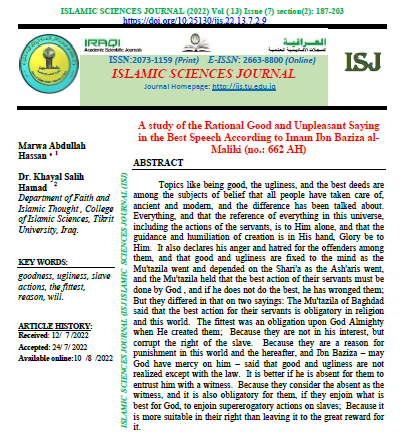A study of the Rational Good and Unpleasant Saying in the Best Speech According to Imam Ibn Baziza al-Maliki (no.: 662 AH)
Main Article Content
Abstract
Topics like being good, the ugliness, and the best deeds are among the subjects of belief that all people have taken care of, ancient and modern, and the difference has been talked about. Everything, and that the reference of everything in this universe, including the actions of the servants, is to Him alone, and that the guidance and humiliation of creation is in His hand, Glory be to Him. It also declares his anger and hatred for the offenders among them, and that good and ugliness are fixed to the mind as the Mu'tazila went and depended on the Shari'a as the Ash'aris went, and the Mu'tazila held that the best action of their servants must be done by God , and if he does not do the best, he has wronged them; But they differed in that on two sayings: The Mu'tazila of Baghdad said that the best action for their servants is obligatory in religion and this world. The fittest was an obligation upon God Almighty when He created them; Because they are not in his interest, but corrupt the right of the slave. Because they are a reason for punishment in this world and the hereafter, and Ibn Baziza – may God have mercy on him – said that good and ugliness are not realized except with the law. It is better if he is absent for them to entrust him with a witness. Because they consider the absent as the witness, and it is also obligatory for them, if they enjoin what is best for God, to enjoin supererogatory actions on slaves; Because it is more suitable in their right than leaving it to the great reward for it.
Article Details

This work is licensed under a Creative Commons Attribution 4.0 International License.
COLLEGE OF ISLAMIC SCIENCES, TIKRIT UNIVERSITY. THIS IS AN OPEN ACCESS ARTICLE UNDER THE CC BY LICENSE http://creativecommons.org/licenses/by/4.0/

